Iran Home To Over 120,000 Working Children: Official
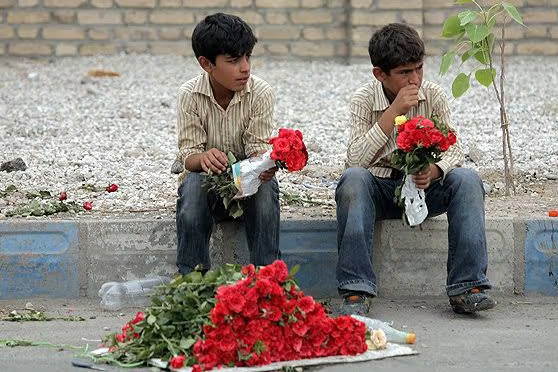
The Iranian regime has admitted that at least 120,000 minors are working as child labourers, although the real figure may be far higher.

The Iranian regime has admitted that at least 120,000 minors are working as child labourers, although the real figure may be far higher.
An official at Iran’s Welfare Organization, Mohammad Reza Heydarhaie, revealed the figure of workers aged under 18 speaking to semi-official news agency ISNA on Monday.
Tens of thousands of children have had to drop out of school and try and scrimp a living to help their family survive amid the continuing economic crisis with sky-rocketing inflation of nearly 50 per cent.
Heydarhaie also admitted there has been a surge in the number of children living on garbage dumps.
Many also sell goods in the streets, clean cars or are exploited by adults as professional beggars.
Heydarhaie said: “According to the latest figures, there are a total of 120,000 minors in the country who are in child labor.”
He added: "Last year, 14,500 street children were identified, of which about 10,500 used the services of the welfare organization, and the rest did not want to receive such services."
It is believed that more than 5% of construction work in Iran is being done by children, despite the dangers.
Those employing children benefit from greater profits thanks to their lower wages.
Campaigners say that government institutions are not only reluctant to solve this problem, but are the main culprits.
Heydarhaie claimed it is against the interest of children for them to be forced off the streets by officials, saying: “It does not solve their problem,” and would put them out of reach of help from welfare organisations.
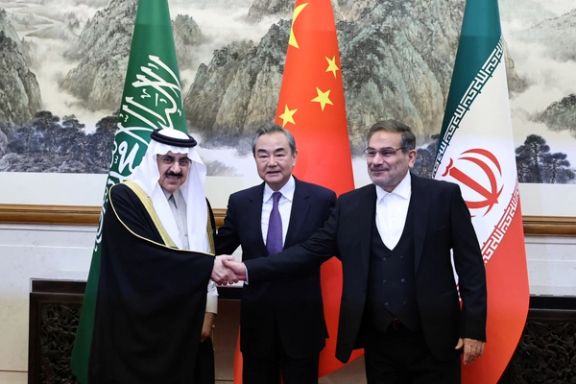
Iran said Monday it has officially invited Saudi Arabia's king for a visit, after the two countries agreed to restore relations in a China-brokered deal in March.
"Iranian President (Ebrahim Raisi) has sent an invitation to the Saudi king in return for an invitation by Riyadh for him," Nasser Kanaani, spokesman of Iran’s foreign ministry told a news conference.
After years of bad relations that fueled proxy conflicts across the Middle East, where Tehran and Riyadh backed opposite sides from Yemen to Syria, the Shi'ite revolutionary Iran and the Sunni-led Kingdom reached an agreement to end a seven-year diplomatic rift.
Technical delegations from both countries are preparing to officially reopen their missions, and Tehran said these missions would restart their activities by May 9, Iran's semi-official Tasnim News agency reported.
The Chinese brokered deal is seen as a sign of Beijing’s growing influence in the region at the expense of Washington that for decades has protected rich Arab oil exporters and tried to contain threats from the Islamic Republic of Iran.
Kanaani in his briefing claimed that the United States is no longer a superpower and “international circumstances have changed.” The era of “America as a superpower has come to an end,” he said and the Islamic Republic took advantage of the change, opting ‘for regional convergence to secure common interests.”
Analysts say that Saudi Arabia was interested to end the conflict in Yemen where for eight years it has been involved in a war against Iran-backed Houthis.
Iran in turn faces a serious economic crisis partly triggered by crippling US sanctions since 2018, when former President Donald Trump withdrew from the Obama-era JCPOA nuclear deal demanding tough concessions from Tehran.
The Biden administration launched indirect talks with Iran to revive the JCPOA, but after 18 months of negotiations the process reached a deadlock last September, leaving the sanctions in place.
Kanaani speaking about the nuclear issue Monday insisted that Tehran never left the negotiating table with the West. He maintained that Tehran is ready to continue talks based on a draft agreement that was presented by the European Union last August.
Iran has continued high-level uranium enrichment since early 2021 when it began talks to revive the JCPOA, and has amassed enough fissile material to reach the stage of weapons development in a few weeks, according to most estimates.
Meanwhile, there is an ongoing dispute with the International Atomic Energy Agency (IAEA) over Iran’s secret nuclear activities prior to 2003.
IAEA chief Rafael Grossi paid a visit to Tehran in early March, just before a meeting of the Agency’s board to iron out differences.
After his visit he claimed that an agreement was reached with Tehran to resolve differences and boost IAEA’s monitoring of Iran’s nuclear activities.
However, follow-up meetings announced by Grossi never took place and there has been no news of any progress.
The result of his trip was that IAEA’s board never censured Iran for its violation in its March meeting, in what appeared to be another diplomatic maneuver by Tehran to buy time.
Kanaani claimed Monday that contacts with IAEA continue, without providing any details. Grossi has been largely silent since his trip to Tehran.
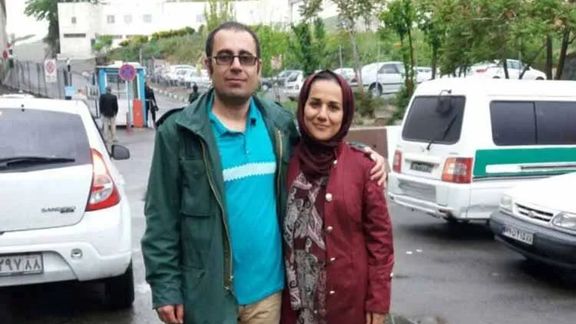
Fears are growing for Iranian Teachers Trade Association spokesperson Mohammed Habibi with no news on his whereabouts almost two weeks since his arrest.
His wife Khadijeh Pak-Zamir told Sharq daily on Sunday: “We have no information about his case and have not been notified of any charges. We have not been allowed to meet him and all this has made us worried about his health.
“I don't know if my husband is still in Ward 209 of Evin Prison, or if he has been transferred to another place or solitary confinement.”
Prisoners in Ward 209 are subject to torture by the Ministry of Intelligence, according to human rights campaigners.
Habibi is one of a number of activist teachers who have been targeted by the regime for protesting for political freedom and against economic hardship.
Hei was arrested on April 5 at the school where he teaches, just outside Tehran, less than two months since he had been released from prison.
In the arrest warrant, the human rights defender was charged with "gathering and collusion" and "propaganda against the government", his wife said.
He had been released from the notorious Evin prison on February 8 as part of a so-called general amnesty announced by the Iranian judiciary on the occasion of the 44th anniversary of the Islamic Revolution.
Habibi had twice lost his job teaching under the pretext of “unjustified leave of absence” while he was behind bars.
In August 2018 he was jailed for “collusion against national security”, and “propaganda against the regime” for his peaceful activities in the teachers’ association. He was released from prison in November 2020 but jailed again last year.
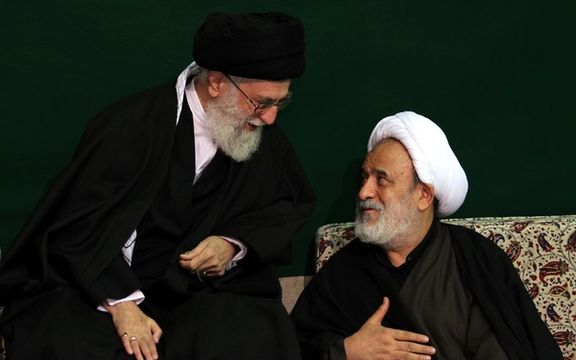
In an unprecedented move Hossein Ansarian an influential Iranian cleric harshly criticized the physical and psychological torture of political prisoners.
Speaking at a Ramadan-related religious ceremony last week, Ansarian whose remarks were being broadcast live on the Iranian state television told security officials: "If you have someone under arrest, do not lie to him about his imminent execution. Do not scare those who worship God."
Months of anti-regime protests and the insistence of hardliners to force hijab upon women, has led to a public debate in Iran, with some regime insiders condemning repressive policies.
The comment brought many reactions on social media, with some saying Ansarian is going his own separate way, while others pointed out that "he is now standing with the people." . Some of Iran's high-ranking clerics such as Ayatollah Abdollah Javadi Amoli also defended Ansarian.
Others posted comments by former Presidential Adviser Mohammad Ali Abtahi who recalled that when he was jailed in 2009, he was told by his interrogators that he was going to be executed the next morning.
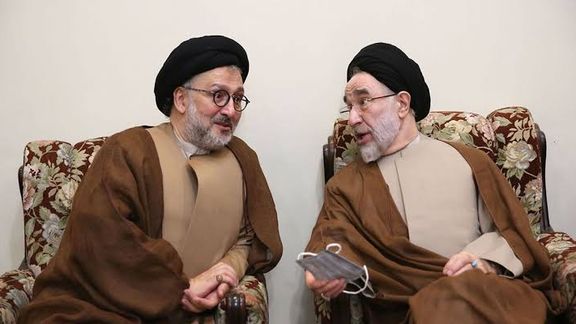
Responding to those who said Ansarian has disembarked from the train of the Islamic Revolution, Abtahi said that if Ansarian is not on the train, it must have been hijacked.
This comes while, IRGC general Esmail Kowsari, currently a member of the Iranian parliament, denied the accounts about threatening prisoners with execution, and said: "We do not have torture in Iran. Some people complain about being tortured as soon as they are deprived of sleeping for a few hours. We do not force confessions."
Ansarian who is known to be close to regime officials and has been often seen delivering religious speeches at Supreme Leader Ali Khamenei's house also talked about the hijab controversy and the regime’s harsh measures against women who defy compulsory hijab. He said he respected Iranian women and believed that 90 percent of them complied with the religious teachings about hijab.
Ansarian said: "If you want to arrest women for not observing hijab rules, come and arrest me instead." Furthermore, he called on Iranian security officials to respect prisoners, not to swear at them or humiliate them, not to beat them, and stressed that all of these behavior are strictly prohibited in Islam." He repeated, "They are haram."
Apart from Abtahi, many other former political prisoners in Iran have said that they had been subjected to mock executions as a tool of intimidation. According to Iran International, Sahand Mohammadzadeh, who was arrested during the protests last year, has said that interrogators pretended they were going to execute him. He said he was also tortured in other ways during his imprisonment which followed a seven-minute trial.
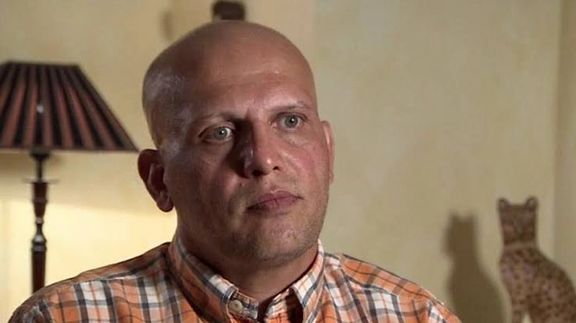
Another former prisoner, Maziar Ebrahimi who was jailed on the false charges of assassinating Iran's nuclear scientists in 2010s, revealed in 2019 in detail about having been tortured in Iranian prisons.
Following the November 2019 protests in Iran, Amnesty International listed mock executions among other forms of tortures used against Iranian political prisoners.
During recent days, other regime insiders including hardliner eulogist Mahmoud Karimi have said that authorities ordered him not to talk about religious stories that advocated compassion toward prisoners.
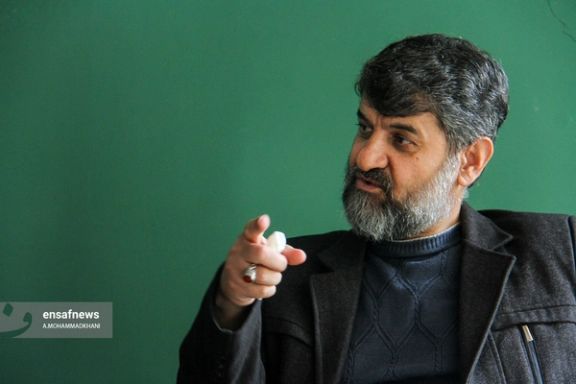
Meanwhile, Mehdi Nasiri, a former editor of the Kayhan newspaper has also openly spoken in criticism of Khamenei, blaming him for the country's problem. Sedigheh Vasmaghi, a female jurisconsult has also warned Khamenei that he would be responsible for dividing Iranians over the issue of hijab.
According to Iran International, as more regime insiders begin to speak about the problems in the core of the regime, this can give way to the assumption that the crisis in the core of the regime has become so obvious that could be concealed.
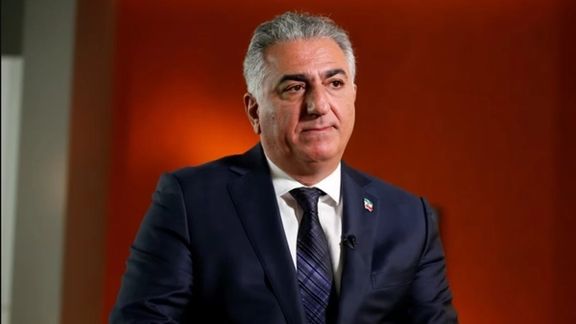
Iran’s exiled Prince Reza Pahlavi travels to Israel amid rising tensions with Iran, “to deliver a message of friendship from the Iranian people,” he tweeted Sunday.
The news comes as in recent weeks Iranian military and political officials have openly encouraged Palestinians to attack Israel as their proxy forces in Gaza and Lebanon fired dozens of rockets at Israeli settlements.
Iran’s government media was silent as of Monday morning on the announcement, which they will probably later paint as treason by the heir to the Iranian throne, who is one of the leading representatives of the protest movement against the clerical regime outside the country.
Pahlavi said in his tweet that he will also “pay respect to the victim’s of the Holocaust on Yom HaShoah.”
This would be the ultimate rebuke to the Islamic Republic of Iran whose leaders and officials have in the past cast doubt on the holocaust and even held conferences and cartoon competitions to mock the greatest mass killing of the 20th century.
Top Iranian regime officials have also repeatedly threatened to destroy Israel, with a countdown clock installed in Tehran that indicates Israel will cease to exist by 2040.
Israel and Iran had amicable relations during the monarchy, when tens of thousands of Jewish-Iranians lived in peace and harmony for long centuries. The great majority left Iran around 1979 when the anti-Israeli revolutionaries toppled the monarchy and began a reign of terror against those they deemed as undesirable.
Many Jews in Israel and in the diaspora see a historic friendship with the Iranian people going back 2,500 years, when Persian king Cyrus the Great freed Jews who were in captivity in Mesopotamia and helped them to return to Jerusalem.
Most Iranians who oppose the clerical regime also express friendly and supportive attitudes toward Israel and see their government’s financial and military backing of anti-Israeli forces in the region as a waste of their national wealth.
Following Pahlavi’s announcement, Israel’s Intelligence Minister Gila Gamliel said: “We’re taking the first step toward rebuilding ties between our peoples.”
A statement issued by the minister added, “We’re happy to host the Iranian crown prince and admire his courageous decision to visit Israel for the first time.”
“The crown prince symbolizes a different leadership than that of the ayatollahs’ regime and promotes the values of peace and tolerance, unlike the reigning extremists in Iran."
Reza Pahlavi insists on establishing a democratic and secular political system in Iran and says it is up to the people to decide whether they want to re-establish constitutional monarchy or a republic once the Islamic regime is gone.
In the statement, Pahlavi was quoted as saying, “The Iranian and Jewish people have ancient bonds dating back to Cyrus the Great and Queen Esther. As the children of Cyrus, the Iranian people aspire to have a government that honors his legacy of upholding human rights and respecting religious and cultural diversity, including through restoration of peaceful and friendly relations with Israel…”
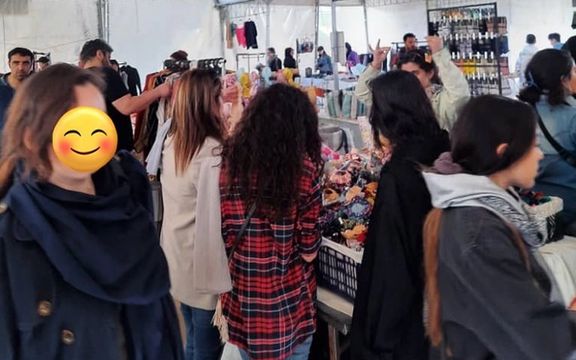
Despite the many economic woes including inflation and recurring protests, Iran's police, judiciary and other authorities have focused on hijab enforcement.
Police said Sunday that on the first day of the implementation of its new hijab enforcement plan it had warned 3,500 businesses about hijab infringements on their premises. They also shut down 137 shops as well as 18 restaurants and wedding hall-gardens that were repeat offenders and referred their cases to the judiciary for further action.
According to police spokesman Brigadier Saeed Montazerolmahdi, police also warned owners of several hundred vehicles whose drivers or passengers were spotted hijabless by text messages.
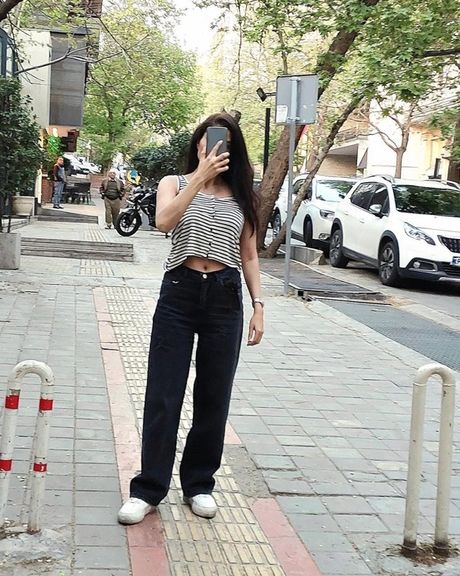
“The police force will enforce the law against a small number of people who look like they have arrived from a different planet, are unaware of the norms and traditions of the country, and break the law,” he said.
Cycling “hijabless” at Tehran’s Keshavarz Boulevard on April 16.
Police officials warned last week that the campaign against women who do not abide by the hijab rules would begin Saturday with the help of public CCTV cameras.
Many women, however, have shared photos of being in the streets, parks and other public areas without hijab on social media despite the harsh warnings.
Since Khamenei’s declaration of “hijablessness” being not only religiously but also politically forbidden, Iranian officials have focused on the hijab issue despite the many other problems such as high inflation and corruption that the country is facing.
Workers and retirees who resumed their scattered protests after the New Year holidays in early April complain that their dire circumstances are being ignored at the cost of re-establishing the regime’s control over women for hijab. “Bridling inflation was only an empty slogan,” protesting retirees in Shushtar in Khuzestan province chanted Sunday.
Protesting retirees in Shushtar chanting “Bridling inflation was only an empty slogan”
Meanwhile, students staged sit-ins in several universities in Tehran in protest to officials cracking down on women for hijab, using harsh punitive actions against dissident students.
In recent days authorities have denied entrance to women whose tunics were considered as “too short” or for wearing make-up in some universities. Punitive actions such as suspensions, for as long as two years, for hijab and political activities have also been reported in several universities.
“Stop suffocation and suppression in universities” and “Freedom of choice over hijab is the Iranian women’s right”, were some of the placards protesting students held at the psychology and educational sciences faculty of Tehran University.
“Schoolgirls are being poisoned, teachers are in prison, and all they care about is hijab!” protesting students chanted at the social sciences faculty in the same university.
Girls behind the gates of Rasht Azad University waiting for inspection of their appearance before entering.
In a statement Saturday, fifteen prominent Iranian lawyers and rights activists warned the government over its “suppressive policy” of imposing hijab and said a truth finding committee of the United Nations would be required to investigate the harms caused by these policies.
The statement signed by lawyers and human rights activists from inside Iran and abroad including Nasrin Sotoudeh and other rights defenders have urged that UN human rights sanctions should be imposed on those involved in violence against women for hijab.
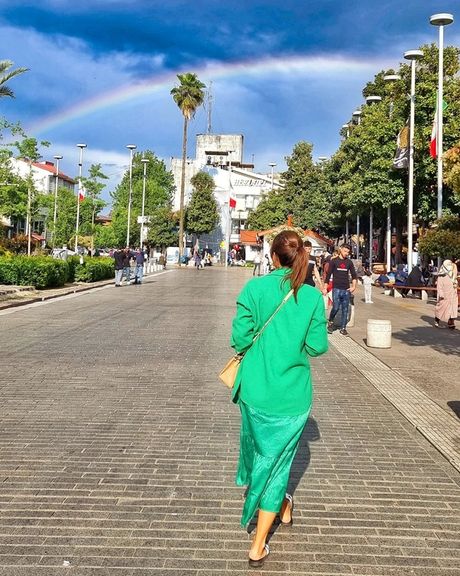
“Unable to establish justice and equality of women and men as the most basic of legal principles, the Islamic Republic is expanding the suppression of women in contradiction to basic human and civil rights, by forging new terms such as ‘politically haram’ while continuing its clear repressive policies,” the statement said.
“Politically haram” is a term first used by Supreme Leader Ali Khamenei on April 4. “Discarding hijab is haram (sin) based on Sharia and also politically,” Khamenei emphatically declared at a meeting with state officials while claiming that foreign intelligence services were encouraging Iranian women to disobey mandatory hijab.